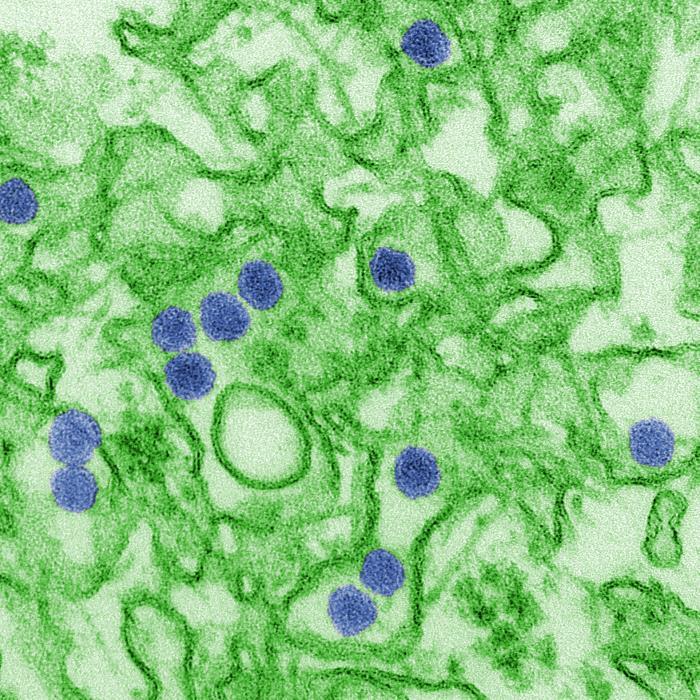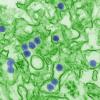In a development that could help unravel key questions about the spread of Zika virus and speed the hunt for drugs and vaccines, Texas researchers today described the first genetically cloned version of the virus.
In other news, Germany reported its first case of sexually transmitted Zika virus, and Argentina reported its first local cases, apart from its earlier sexual transmission case.
Clone could help with countermeasures
The Zika virus clone was developed by researchers at the University of Texas Medical Branch (UTMB) at Galveston, and the team reported its findings today in Cell Host and Microbe.
Existence of a Zika clone allows researchers to more easily identify reasons for the explosive spread of the virus, which could include easier transmission by Aedes mosquitoes or that it gained the ability to sustain high viral levels in humans.
First the researchers cloned five fragments that cover the complete Zika virus genome, then assembled the pieces into a full-length Zika virus clone. To test its function, they fed Aedes aegypti mosquitoes human blood infected with either naturally occurring Zika virus or its cloned counterpart. The number of mosquitoes infected was similar for both types of viruses, confirming that cloned version is highly infectious to the mosquito and that A aegypti may be a good Zika virus transmission vector.
In tests on mice that were modified to make them susceptible to Zika virus infection, the clone of Zika infected the animals and caused neurologic disease.
To help other scientists with future experiments, the UTMB team made a Zika virus with a marker made from luciferase, a chemical that gives fireflies their hallmark glow. The "marker" clone can be used to screen antiviral drugs and could help track infection in mosquitoes and small animals.
Pei-Yong Shi, PhD, study coauthor and professor in the department of biochemistry and molecular biology at UTMB, said in a press release from the school that the study is an example of collaboration between many teams on the UTMB campus. "The new Zika clone, together with mosquito infection models and the UTMB-developed Zika mouse model, represent a major advance towards deciphering why the virus is tied to serious disease."
Sexual transmission in Germany, local spread in Argentina
Germany reported a probable Zika sexual transmission case in a woman who got sick after having unprotected sex with a man who had been ill after returning from Puerto Rico, according to a May 13 Associated Press (AP) report, which cited a statement from Germany's Robert Koch Institute.
The man was sick 2 weeks before the woman became ill, and the woman had not visited a Zika-affected country since the middle of January.
Elsewhere, Argentina reported local Zika spread in one of its provinces, the first cases of local transmission there apart from a sexually transmitted case reported at the end of February. The two latest cases from Argentina appeared in the May 13 weekly communicable disease threat report from the European Centre for Disease Prevention and Control (ECDC).
The cases are both in Tucuman and were detected during febrile illness surveillance, according to a May 7 machine translated report from the provincial government. Located in northwestern Argentina, Tucuman is the country's most densely populated province.
The patients are adults who live in the southern part of San Miguel de Tucuman district. Both have already recovered at home. One case was confirmed at the provincial lab, and the other was confirmed at the National Institute of Viral Diseases Lab near Buenos Aires. Neither patient has a history of travel to other regions or countries where the disease is circulating.
In late February, Argentina reported a likely sexually transmitted Zika virus case in a woman from Cordoba province who apparently contracted the illness from a person who came down with symptoms after returning from Colombia.
Funding developments
- In other news, the US Department of Defense (DoD) is providing $1.76 million in extra funding to help military labs boost global Zika virus surveillance and gauge the impact of the virus on deployed service members, according to a DoD report today. Navy Commander Franca Jones said the enhanced surveillance will involve 10 projects in 18 countries by four US-based lab partners and five partners based overseas.
- Measures to move Zika emergency funding forward appear to be headed for action in the Senate and House this week, The Hill reported today. A bipartisan Senate bill to provide $1.1 billion in funding will likely go to the Senate floor for a vote on May 19. In the House, meanwhile, House Appropriations Committee Chairman Hal Rogers (R-Ky.) today introduced legislation to provide $622.1 million in Zika funding in a bill based on spending offsets. It may reach the House floor for a vote sometime this week.
See also:
May 16 Cell Host Microbe abstract
May 16 UTMB press release
May 13 AP story
May 13 ECDC weekly communicable disease threat report
May 7 Tucuman province Zika statement





















